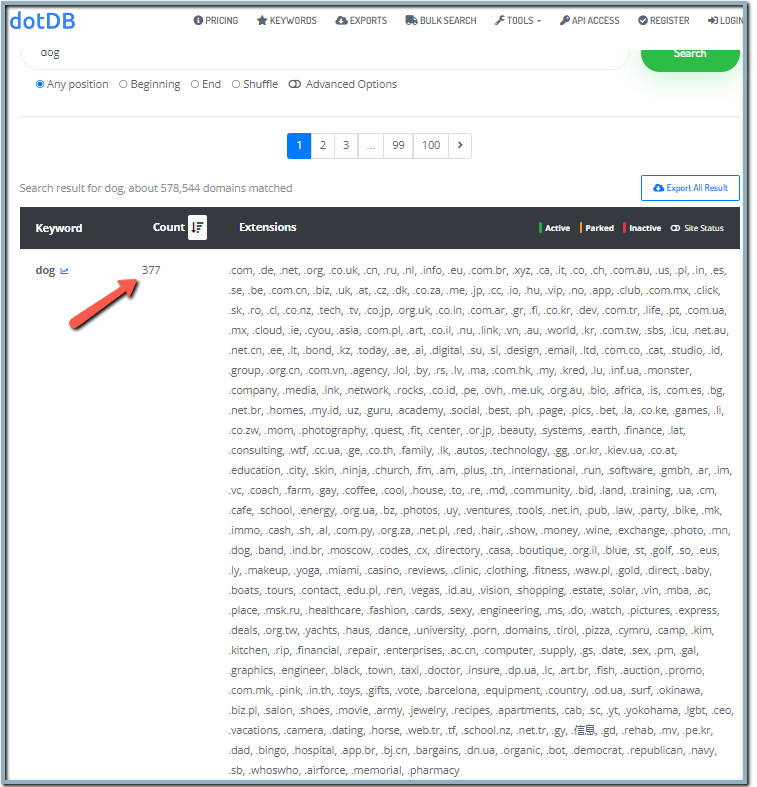What is a Top-Level Domain, and what significance does it have for my business?
A TLD, or “Top-Level Domain,” is the highest level in the domain name system hierarchy. It’s the last part of a domain name, following the final dot (e.g., .com, .org, .net). TLDs are used to categorize and organize websites on the internet. They are also known as domain extensions, URL extensions, and domain suffixes.
There are five official types of TLDs:
- Country Code Top-Level Domains (ccTLDs) are two-letter domain extensions associated with specific countries or territories. Examples include .us (United States), .uk (United Kingdom), .ca (Canada), and .jp (Japan).
- Generic Top-Level Domains (gTLDs) are generic and not specific to any particular country or region. Examples include .com, .org, .net, .info, and newer ones like .biz, .xyz, .app, .blog, and .guru.
- Infrastructure Top-Level Domain (ARPA) stands for “Advanced Research Projects Agency,” and it has historical significance in the development of the internet. The ARPA TLD was one of the original TLDs created during the early stages of the ARPANET, the precursor to the modern internet. It is only used for technical infrastructure purposes. You cannot purchase this.
- Sponsored Top-level Domains (sTLD) are intended for a particular community or group of organizations. Unlike generic TLDs like .com, .org, or .net, which are open for registration by anyone, sTLDs are managed and operated by organizations or entities that have a specific relationship to the domain’s purpose or theme. Examples are .gov and .edu.
- Test Top-Level Domains (tTLD) are reserved for testing and documentation purposes. You cannot purchase these. The four tTLDs are .example, .invalid, .localhost, .test.
Why are TLDs Important for Online Businesses?
The choice of TLD for your business URL can have several significances:
Branding: The TLD you choose can contribute to your brand identity. For instance, .com is often associated with commercial businesses, .org with organizations or non-profits, and .net with networking or technology-related entities.
Credibility and Trust: Some TLDs are considered more trustworthy or established than others. .com is generally viewed as a reputable and reliable choice, which is why it’s one of the most popular TLDs.
Geographic Relevance: If your business primarily serves a specific country or region, using a ccTLD can signal your local presence and relevance to users in that area.
Availability: Depending on the popularity of a TLD, certain domain extensions might have more available options for your desired business name. This can impact your ability to secure a memorable and relevant domain name.
SEO Considerations: Some studies suggest that having a relevant keyword in your domain name and TLD might have a slight influence on search engine optimization (SEO).
Ease of Remembering: Short, simple, and familiar TLDs are often easier for users to remember, making it more likely that they’ll return to your website.
Your choice of TLD can impact your branding, credibility, and accessibility, so it’s worth considering these factors when selecting a domain name for your business.
What are considered some of the best TLDs for my company?
The best TLD, or domain extensions for your business or service can depend on various factors, including the nature of your business, your target audience, and your branding strategy. However, some TLDs are generally considered more popular, reputable, and versatile.
The following three were some of the first internet domains, created in 1985. Most people are familiar with them:
.com: This is by far the most popular and widely recognized TLD. It’s associated with commercial websites and is considered the default choice for businesses. It’s often the first choice for many companies due to its credibility and familiarity.
.net: Historically associated with networking and technology, .net is commonly used by tech companies, internet service providers, and networking-related websites.
.org: Originally intended for non-profit organizations, .org is also used by various other entities, including community groups and educational institutions. It can convey a sense of purpose and authenticity.
Here are a few other TLDs that are often considered strong choices:
.agency: Suitable for marketing agencies, creative agencies, and other service-based businesses that want to emphasize their agency status.
.ai: Originally the ccTLD for Anguilla, .ai is popular among artificial intelligence and tech companies, given that “AI” is a common abbreviation for “artificial intelligence.”
.app: This TLD is a more recent addition and is associated with applications and software. It’s a good choice for businesses in the mobile app or software development industry.
.biz: This TLD clearly indicates that your website is one centering around your company or service, as the .biz an an abbreviation for business.
.blog: Designed for bloggers and content creators, .blog can be a fitting choice if your website is focused on sharing articles, stories, or other forms of written content.
.club: Perfect for communities, social clubs, and hobbyist groups that want to create a sense of belonging and camaraderie.
.co: Although technically the ccTLD for Colombia, .co has been marketed as an alternative to .com and is often used by businesses aiming for a global presence.
.design: Perfect for designers, design agencies, and creative professionals, .design showcases a strong focus on creativity and aesthetics.
.guru: Suitable for experts, consultants, and instructors, .guru emphasizes expertise and knowledge in a particular field.
.health: Tailored for health-related businesses, medical practices, and health-focused organizations to establish credibility in the healthcare industry.
.io: While initially the ccTLD for the British Indian Ocean Territory, .io has gained popularity among tech startups and companies due to its association with input/output or technology-related terms.
.online: A versatile TLD that can be used by a variety of online businesses and services.
.space: A unique and creative TLD that can be used for a variety of purposes, including startups, creative projects, and collaborative spaces.
.store: Ideal for e-commerce businesses, this TLD clearly indicates the nature of your website and can be memorable for potential customers.
.tech: Aimed at the technology sector, .tech is a popular choice for startups, tech companies
.world: Suitable for global businesses, organizations, and initiatives with an international focus.
.xyz: Doesn’t have specific geographic associations, making it a suitable choice if your business serves an international audience.
Country Code TLDs (ccTLDs): If your business serves a specific country or region, using the corresponding ccTLD can establish local relevance. Examples include .uk (United Kingdom), .ca (Canada), and .de (Germany).
Top-Level Domain variety
Remember that while these Top-Level Domains are commonly recognized and used, there are many other TLDs available, each with its own unique associations and potential uses. There are hundreds of domain extensions to choose from. Just to get an idea how many, we’ve done a search for “dog” at DotDB.com. DotDB is a great resource to check how many variations of a domain name have been registered, among other things:

The best TLD for your domain name will depend on your specific business goals, target audience, and branding strategy. If you would like to speak with a domain consultant, visit the contact page for a no-cost consultation.

